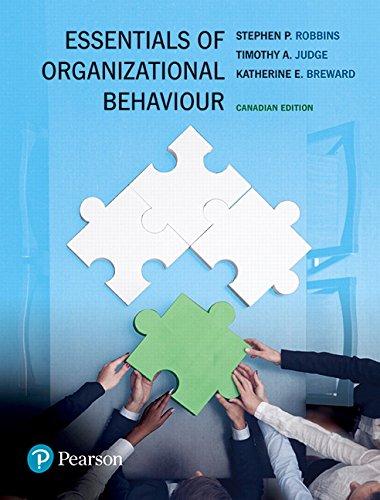In 2013, the Canadian academic community was shocked to learn that five established professors in McMasters DeGroote
Question:
In 2013, the Canadian academic community was shocked to learn that five established professors in McMaster’s DeGroote School of Business were sanctioned for harassment and for creating a hostile working environment. The sanctions imposed included lengthy multiyear suspensions that essentially ended the academic careers of some of the perpetrators. The dispute arose because the professors involved sought to deny their dean, Paul Bates, a second term. Even when he was first appointed, Bates was a controversial choice. He was selected to revive an underperforming undergraduate and graduate business program. His prior career had been in business and his academic experience was limited. Some professors felt this made him ill suited to lead a teaching and research-focused faculty, while others considered his industry experience a strength. As it happened, several of the individuals who were against the appointment were later angered by decisions Bates made about related programs and affiliated institutes. For example, one of the ringleaders of the group of five, Dr. Bart, was removed from his executive role at the Director’s College of Canada, a McMaster-affiliated governance school that educated industry professionals. Another, Dr.
Taylor, had his Health Leadership Institute shut down due to extremely poor financial performance. These decisions, while financially and strategically sound for the university as a whole, solidified their resistance to Bates.
Professors have a right to share opinions about the appropriateness of academic appointments in their department; however, the tactics used by the five were inappropriate. All five were tenured, meaning that they had a remarkable level of job security. They were also well-respected, valued senior experts in their fields. They tried to interfere with the promotions of a total of nine junior faculty members, including those who did not yet have tenure, if those junior faculty members did not share their perspective on Bates. Since promotion decisions in academic departments are made by committees that would have included some of these five as members, these threats were credible. The five also unfairly undermined the research efforts of Bates supporters through excessive, harsh, ongoing criticism that went well beyond the normal peer review processes, and through denial of contracts for extra teaching activities beyond the normal workload. Victims reported extreme stress and anxiety as a result of this harassment, up to and including the development of depression and sleep disorders requiring medical intervention. Support staff were also impacted, one administrator going so far as to ask for a panic button in her office lest violence break out as a result of the tense workplace atmosphere.
Interestingly enough, the panel that decided upon the suspensions noted that they would have recommended firings rather than mere suspensions, except that the university failed to respond to the situation appropriately as it developed. This heightened the problem to the point where
“manageable issues and differences among faculty became insidious and destructive.” But the university’s problems did not end there. In 2014, over 15,000 pages of documentation were submitted to the Ontario Divisional Court as part of an application for judicial review of the suspensions. The review was requested due to concerns about the process used to suspend the five professors. The harassment itself is not disputed, but the fairness of the disciplinary process is under consideration.
Originally, two investigations had been conducted: one by McMaster’s Human Rights and Equity Services office and another by a panel of professors from other departments. Both found substantive breaches of the institution’s antiharassment policy. University spokesperson Gord Arbeau said, upon hearing about the judicial review, that “the university is confident that its processes and policies are fair and balanced and looks forward to the start of the review.” The faculty involved disagree. They argue that the process was unfair because no informal resolution or mediation was attempted, the deadlines they were given to submit information were unfair, and group complaints were consolidated. There was also secrecy surrounding the process. Sessions were closed and people providing affidavits were told to keep the process secret. The university did not release details about the complaints to the public and did not name accusers or accused, or even all the details of the sanctions taken. This deficit of information and attendant silencing creating an environment that made a fair hearing difficult.
This case will likely remain open for some time as details are further examined. In the meantime many uses of power can be observed, some of them inappropriate.
Discussion Questions
1. Using power as your lens, explain why Dr. Bart and Dr. Taylor may have felt they could get away with intimidation and harassment in this context.
2. How do the universities policies and processes contribute to an individual’s ability to use power in this situation? Explain your answer.
3. Assume five years have passed and the suspended professors have not retired, but have decided to return to their jobs. How might you manage their return to work to avoid destructive power issues reemerging on either side?
Step by Step Answer:

Essentials Of Organizational Behaviour
ISBN: 9780134182971
1st Canadian Edition
Authors: Stephen P. Robbins, Timothy A. Judge, Katherine Breward





